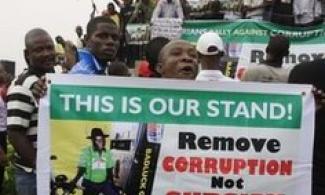
U.S. Energy Subsidiary Named In Massive Oil Ripoff Rocking Nigeria
May 1 (GIN) – So-called fuel importers including a subsidiary of Exxon Mobil billed Nigeria for eye-popping sums of money without importing a single drop of oil.
Details of the wholesale scamming were revealed in a scathing 205 page official report that stunned citizens including Nobel Peace Prize winner Wole Soyinka.
A parliamentary probe, covering 2009 to 2011, found that dozens of petrol marketers, including the state oil company, helped themselves to payments for fuel that did not exist or was sold abroad - siphoning billions of dollars into the pockets of corrupt officials and businessmen.
"Nigerians have been suffering under the deceit of a select few that has milked us all dry in the name of fuel subsidy," said Lawan Farouk, head of the committee that led the probe.
The oil imports were designed to subsidize the price that Nigerians paid at the pump. It was considered one of the few benefits from being an oil-rich country.
Officials in the Goodluck Jonathan administration were named in the report as were 15 fuel importers who allegedly received over $300 million without importing any fuel. More than 100 oil marketers may have double billed. In one case, invoices of 999 million Nigerian dollars were OK’d for payment 128 times in 24 hours.
Mobil Oil contests the figure of $95 million supposedly owed to Nigeria.
Nobel winner Soyinka expressed dismay at the size of the ripoff. He urged Nigerians to return to the streets as they did in January during the Occupy Nigeria protests. ”It is enough. Nigerians must be prepared to march, must be prepared to come out en masse and demand a termination of these years of insolence against the ordinary people.”
Of those named in the report, many deny taking part in fraud, with some taking out full-page newspaper ads proclaiming their innocence. w/pix of anti-corruption rally
Africans Demand Higher Wages, Benefits On May Day Holiday
May 1 (GIN) – Calls for better working conditions resounded throughout the continent as Africans marked May First, International Workers Day.
In Nigeria, labor leaders linked the rise of Boko Haram, an insurgent group, with stagnant labor conditions. “That the terrorist ideologues are able to recruit willing and daring foot soldiers with ease lies deeply rooted in the decaying social conditions in our nation: joblessness, hunger, poverty, lack of electricity, illiteracy and lack of access to education”.
In Zambia, Congress of Trade Union President Leonard Hikaumba demanded a full-scale transformation of the national economy that puts the interests of the people first and guarantees the respect for human rights.
Kenyans received news of a higher minimum wage but called a strike anyway for May 14 to protest new health insurance rates.
Ghana’s labor leaders noted the “huge army of unemployed Ghanaians among whom are unemployed graduates from our tertiary institutions... We wish to respectfully ask, “Where are the jobs?”
Finally, the Congress of South African Trade Unions (COSATU) marked May Day under the theme “Celebrating Workers Contribution in the Struggle for Liberation”. Fifteen rallies were organized across all provinces in the country with speakers COSATU, the ANC and the South African Communist Party. w/pix of Nigeria protest
U.S. Reporters On Junket To Central Africa To Observe Military Training
May 1 (GIN) – The U.S. State Department was in the travel business this week, offering tours to a Special Forces base within the Central African Republic – the staging ground for the pursuit of noted rebel commander Joseph Kony.
Reporters were ferried to one of the four bases being used by U.S. forces to search for the Ugandan-born Kony, leader of the Lord’s Resistance Army for over two decades.
Thousands of African soldiers from Uganda, South Sudan, the Democratic Republic of the Congo and the Central African Republic are receiving training here from U.S. forces.
But major obstacles stand in the way of the multi-national search for Kony. "Because there are so few roads and telephones, it often takes weeks for news of an attack to reach the fusion center," NY Times writer Jeffrey Gettleman reported. "By the time the Green Berets sift the information and help dispatch the Ugandan hunting squads, Mr. Kony is gone. The Americans say they never go on patrols themselves."
The biggest challenge is Mr. Kony’s turf, the size of California and so rugged that American gadgetry mostly useless. “Picture towering trees that blot out the sun, endless miles of elephant grass, and swirling brown rivers that coil like intestines and are infested with crocodiles; one of them recently ate a Ugandan member of the force,” Gettleman wrote.
Meanwhile, a warlord has taken over several towns in eastern Democratic Republic of Congo. Known locally as "the Terminator", Gen. Bosco Ntaganda is wanted by the International Criminal Court for using child soldiers. w/pix of B. Ntaganda
‘Best Of Short African Fiction’ Named By Caine Prize Judges
May 1 (GIN) – A shortlist of potential winners of the prestigious Caine Prize for African Writing was announced today. Judges described it as “truly diverse from a truly diverse continent.” The five named writers were chosen from 122 entries from 14 countries.
The stories “show the range of African fiction beyond stereotypical narratives,” said chair of the judges, Bernardine Evaristo. “We’ve chosen a provocative homosexual story set in Malawi; a Nigerian soldier fighting in the Burma Campaign of WWII, a hardboiled ‘noir’ tale involving a disembodied leg; a drunk Kenyan youth who outwits his employers; and the tension between Senegalese siblings over migration and family responsibility.”
Last year’s winner was NoViolet Bulawayo of Zimbabwe for a short story following a group of six hungry Zimbabwean children as they go about fending for themselves.
The winner will receive $16,000 when the final selection is announced in July. w/pix of NoViolet Bulawayo
